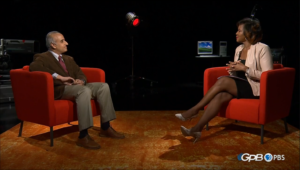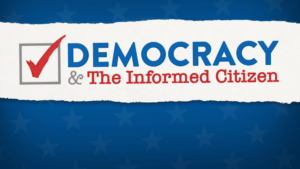Uncovering the News: The Who, Where, When, Why, and How of Media Consumption Today with Georgia Public Broadcasting and Georgia Humanities
by Sydney Boyd, project manager, Humanities in American Life
In the complex national moment we find ourselves today, it has become more and more difficult to tell the difference between opinion and propaganda, fake news and real reporting. For those of us outside the media looking in, we don’t automatically know what reporters mean when they say someone is on background (when a journalist can use information shared by a source but will not identify the source) or how anonymous sources work. And if news tips sometimes come from social media, how is that news different on Twitter than it is on CNN? To get some answers, “Democracy and the Informed Citizen,” a virtual discussion hosted by Georgia Public Broadcasting (GPB) and Georgia Humanities on October 6, took viewers inside the newsroom to “see how the sauce is made,” as GPB News’ Leah Fleming said.
“No matter where you get your news, the goal of this program is to help you recognize how to get the best information available as a responsible news consumer, so that you can contribute to our democracy as an informed citizen,” Laura McCarty, president of Georgia Humanities, said.
In the series of conversations that followed, GPB News’ Fleming, Donna Lowry, and Virginia Prescott talked to Ram Ramgopal (executive editor, CNN), Jocelyn Dorsey (retired WSB-TV broadcaster), and Douglas Blackmon (Professor of the Practice, Georgia State University).
 IMAGE CAPTION: Ram Ramgopal (left) and Leah Fleming discuss the concept of journalism, along with the qualifications of journalists, ethics, and the reporting process, in the live Democracy and the Informed Citizen program that aired on October 6, 2020.
IMAGE CAPTION: Ram Ramgopal (left) and Leah Fleming discuss the concept of journalism, along with the qualifications of journalists, ethics, and the reporting process, in the live Democracy and the Informed Citizen program that aired on October 6, 2020.
First up, Ramgopal described his day-to-day job to Fleming as ensuring that everything CNN puts out is accurate, balanced, and that it’s been vetted to the best of their ability. When the topic of getting news on social media was broached, Ramgopal cautioned consumers to be skeptical.
“If you think something is too good to be true, it probably is not true,” he said. “When I see something on the Twitter feed, I pause and I say, ‘Is this possible? Does it fit the context? Is there something here that we need to dig into, is there something that we may be missing?'”
But doing all that vetting takes lots of reporters on the national and local level, and as the camera turned to Lowry and Dorsey, they pointed out that local news has been struggling. Dorsey said that 36,000 journalists have lost their jobs during the pandemic and news deserts that were already there are growing. Without reporters in court rooms, at school board meetings, and in local communities, no one is keeping the public record or playing the role of the watch dog anymore.
“There is no reporting of local news, and that feeds into corruption,” Dorsey said, citing statistics showing that municipal borrowing rates increase significantly when local newspapers shut down as just one example.
But the burden to seek out the truth falls on the public too, not just on the media, as Blackmon told Prescott in the final conversation of the evening. Prescott pointed out that while media consumption is way up, public confidence in the media has never been so low, and the media is often blamed for exacerbating divisions in America. With the level of polarization this country faces, Blackmon said, everyone is frustrated.
“The reality is that media is a mirror of its viewers, and its readers, and its audience,” Blackmon said.
Blackmon encouraged consumers to remember that people are human beings. Approaching stories and news this way forces people to be more serious about asking themselves, is this person really a monster or was there some kind of misunderstanding?
“We have to find our way back to some one page, some one place, where we’re all willing to accept that we still have some common values, such as a real insistence on telling the truth,” Blackmon said.
 The virtual even was part of “Democracy and the Informed Citizen,” a national grant initiative by the Federation of State Humanities Councils is generously supported by the Andrew W. Mellon Foundation. Other Georgia Humanities resources and events related to the initiative include, “How Journalists and the Public Shape Our Democracy: From Social Media and ‘Fake News’ to Reporting Just the Facts,” a media literary guidebook freely available to the public, and an interview with Georgia Humanities and “A Closer Look” host Rose Scott on National Public Radio station 90.1 FM-WABE.
The virtual even was part of “Democracy and the Informed Citizen,” a national grant initiative by the Federation of State Humanities Councils is generously supported by the Andrew W. Mellon Foundation. Other Georgia Humanities resources and events related to the initiative include, “How Journalists and the Public Shape Our Democracy: From Social Media and ‘Fake News’ to Reporting Just the Facts,” a media literary guidebook freely available to the public, and an interview with Georgia Humanities and “A Closer Look” host Rose Scott on National Public Radio station 90.1 FM-WABE.



